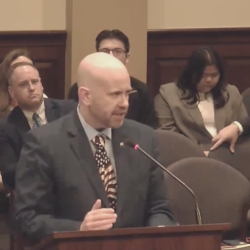Last month, I used the pending decision by the Citizen’s Committee on Legislative Compensation as a springboard to discuss the balance of power in Idaho government. I followed that up with some additional scrutiny of legislative pay, as well as some out-of-the box ideas for how legislators could do a better job of fighting back against bureaucratic overreach.
On the morning of November 6, as most of us were celebrating big election wins from the night before, the Citizen’s Committee met again. They had deadlocked in October on a bipartisan proposal from legislative leadership to raise lawmaker pay by around 43%, and had therefore scheduled a second meeting. This time they unanimously approved raising legislator salaries to $25,000 per year. This would be an increase of just over 25% in base salary alone. Per diem rates are set federally, and those should increase by about 16% from 2024.
While leadership’s recommendation would have pegged base salaries at a percentage of the Average Idaho Household Income (AIHI) index, the committee seems to have pulled the $25,000 number out of thin air. Niklas Kleinworth, policy director at the Idaho Freedom Foundation (IFF), testified in front of the committee on Wednesday:
According to numbers provided by Fred Birnbaum, IFF’s legislative affairs director, the average lawmaker would see a 22.1% increase in total taxable compensation. This includes the meal per diem given to lawmakers who live within 50 miles of the Capitol as well as $2,500 in “constituent service allowance” that would remain unchanged. For various reasons, the IRS does not consider the meal and lodging per diem given to lawmakers who live beyond 50 miles to be taxable income.
Seven incoming lawmakers along with incumbent Sen. Glenneda Zuiderveld issued a press release opposing the pay raise following the vote. The eight signatories presented a resolution for the Legislature to increase the base salary by 2.5% instead. If the Legislature does nothing, the committee’s recommendation will go into effect. Any legislator can introduce a resolution to reject the recommendation or reduce it, but not raise it. Both chambers would have to pass that resolution for it to supersede the committee’s recommendation.
I take no position on this issue either way — que será será. Others have: IFF has written several articles about it, such as this from Birnbaum and this from President Ron Nate, and some of the incoming lawmakers who signed the press release have been outspoken about rejecting the proposal. However, the difference between a 25% increase and a 2.5% increase is less than half a million dollars for the entire Legislature. Real money, for sure, but peanuts compared to many other budget line items.
Critics are right, I think, that the optics of a legislative pay raise are not good. Are they ever? When was the last time you felt so proud of your government that you felt compelled to give them more of your own hard-earned money? Yet the workman is nevertheless worthy of his wages — I’m sure most people agree they should be paid something.
On the other hand, the optics of legislators who don’t need the money voting to withhold a pay raise from those who do aren’t very good either.
In any case, the resolution from the eight will surely be introduced. Will it pass? Will there be vigorous debate? Stay tuned. As always, contact your legislators and let them know your thoughts, whatever those might be. I’m hoping to see a fired-up and engaged citizenry participating in the legislative process this coming year. We’ve been given time to keep our Republic, so let’s not let it go to waste.
Gem State Chronicle is a reader-supported publication. To receive new posts and support my work, consider becoming a free or paid subscriber.
About Brian Almon
Brian Almon is the Editor of the Gem State Chronicle. He also serves as Chairman of the District 14 Republican Party and is a trustee of the Eagle Public Library Board. He lives with his wife and five children in Eagle.













